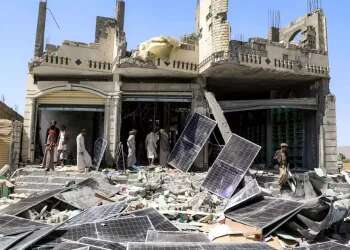The rebels' control over most of Syria and the fall of the Assad regime sparked a faint hope that a new regime in Damascus might adopt a pragmatic stance toward Israel, avoiding open support for its enemies. This hope was bolstered yesterday when al-Julani declared that his government's primary priority is to fight the Iranian axis.
While Jerusalem waits to see how the new Syrian administration will act, one figure is critical for Israeli readers to understand to grasp the worldview of Tahrir al-Sham—the driving force behind the rebels' victory over Assad's regime. That figure is Abdel Rahim Atoun, the mufti of the organization and head of the Shura Council of the government it established in Idlib, before sweeping across most of Syria.
Atoun is a close confidant of al-Julani and played a key role in shaping the ideological and political foundation of the organization, which seeks to govern Syria. His influence is pivotal in the group's shift from global jihadism and al-Qaeda affiliations to embracing a Syrian national identity rooted in Islamist principles. Atoun himself has transformed, altering his rhetoric and even his appearance, trading traditional head coverings and an unkempt beard for a suit and neatly groomed facial hair, often seen seated beside al-Julaniin meetings.

Despite the image of moderation, Atoun's anti-Israel stance has remained unwavering and has even intensified under his new guise. The blend of nationalist sentiment with aspirations for Sunni Islamist rule has brought Atoun closer to the terrorist organization Hamas, with which he consistently expresses solidarity. He eulogized a senior Hamas figure assassinated by Israel in Lebanon, Salah al-Arouri, and celebrated the October 7 attack on his Telegram channel.
Video: Abdel Rahim Atoun at a conference in support of Gaza in Idlib.
Atoun does not shy away from making his position clear. At a conference he convened during the rebel offensive—dubbed "From Idlib to Gaza"—the cleric praised the Palestinians and expressed solidarity with their fight against Israel. "The regional enemy of Syria is Russia, while the regional enemy of the Palestinians is Zionism. The brotherhood of Islam unites Palestinians, Syrians, and all members of the Muslim ummah above all other ties. We are in a position where our commitment goes beyond actions like protests," Atoun stated during the event.

Atoun often draws parallels between the "Iranian project," referring to Tehran's involvement in Syria's internal affairs and its military presence there, and the "Zionist project," which he claims meddles in Syria's affairs and poses a threat to it. In 2021, he condemned the US for its support of Israel, stating, "The wound of occupation in Gaza and the wound of Syria's occupation are the same wound."
It is not yet clear what role, if any, Atoun will hold in the new Syrian government being formed by the rebels in Damascus. However, his profound influence on the leadership of the rebels is undeniable. His statements, delivered under the guise of religious authority, likely reflect at least in part the worldview of those now rising to power on Israel's northern border.




